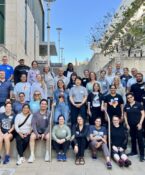SPH welcomes new faculty member Dr. Babayemi Olakunde
- February 20, 2024
- By: Sally Crocker
- Our People
Related Links
 Dr. Babayemi Olakunde has spent the majority of his career coordinating the HIV response in Nigeria. The country has one of the highest burdens of HIV/AIDS in the world, with an estimated 1.9 million people living with HIV and nearly 75,000 new infections per year.
Dr. Babayemi Olakunde has spent the majority of his career coordinating the HIV response in Nigeria. The country has one of the highest burdens of HIV/AIDS in the world, with an estimated 1.9 million people living with HIV and nearly 75,000 new infections per year.
Olakunde has now brought his expertise in population and community health to The University of North Texas Health Science Center at Fort Worth as a new assistant professor at the HSC School of Public Health.
Olakunde is an epidemiologist and implementation scientist with more than a decade of experience in clinical care, public health programming and health systems strengthening in sub-Saharan Africa. His research has focused on understanding the burden of infectious diseases, cancers, maternal and child health, and improving the implementation and uptake of evidence-based interventions, particularly among underserved and vulnerable populations.
He has experience working for a federal agency, managing and providing strategic and technical support to government and donor-funded HIV programs, and engaging diverse stakeholders at national and sub-national levels. He has also been involved in teaching and mentoring graduate students, health care providers and program managers.
Most recently, Olakunde served as assistant director for the National Agency for Control of AIDS in Nigeria, and as the technical lead for the Prevention of Mother-to-Child Transmission of HIV program. He was also a senior research fellow at the Center for Translation and Implementation Research at the University of Nigeria.
He received his PhD in public health from the University of Nevada, Las Vegas, and his Master of Public Health, with distinction, from the University of Sheffield in the United Kingdom. He completed a bachelor’s degree in medicine and surgery from Obafemi Awolowo University in Nigeria.
“Public health issues captured my interest during medical school. I wanted to learn more about pressing public health concerns and how they could be solved,” Olakunde said.
“People still die from vaccine-preventable diseases and women still die from preventable or treatable pregnancy-related complications. Health literacy and access to care are huge public health problems. Even when people have access to a health facility, quality of care is a concern. I want to be able to address issues like these to improve health and wellbeing.”
Olakunde was attracted to teaching at the HSC School of Public Health because of the opportunities to prepare students for a career in public health research and practice.
“HSC’s research focus and interests align well with my work. The environment and the School of Public Health faculty are inclusive and committed to health equity and finding solutions for healthier communities. I wanted to be in a place that generates research and high-quality evidence to inform policy, with opportunities for collaboration,” he said.
Olakunde said he is already enjoying Texas and the local Tarrant County community. He has friends and family here, finds the warm weather appealing, and considers the local community to be “very friendly and welcoming.”
“We are happy to welcome Dr. Olakunde to the SPH team,” said Dr. Shafik Dharamsi, dean. “His background in research and finding solutions to pressing public health challenges is a very good fit for our school and aligns well with the goals of our new SPH strategic plan, IMPACT 2030 – Commitment to Community.”





Social media